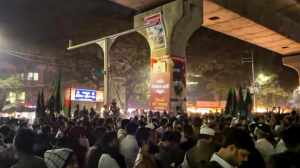Pact with India divides Nepal
PM Bhattarai under fire from within and without,gets support from loyalists and main Opposition
Nepal Prime Minister Baburam Bhattarais visit to India,during which he claims to have taken bilateral relations to a new height,has left divides among parties and within his own starker than ever in a country where politics has always been marked by fragility and uncertainty.
The main opposition Nepali Congress has indicated that it supports a treaty Bhattarai signed with India,but other parties and a faction of his own have made it clear they dont. The Bilateral Investment Promotion and Protection Agreement BIPPA that Bhattarai signed with New Delhi guarantees the security of Indian investments in Nepal.
Its a positive development if the Maoists accept liberalisation and sincerely protect foreign investment, said Dr Ram Sharan Mahat,a former finance minister and member of the Nepali Congress central committee.
The hostile reactions from other quarters began the moment Bhattarai landed in Kathmandu after his four-day goodwill visit. Among the opponents is a Unified Communist Party of Nepal-Maoists UCPN-M faction,loyal to the partys senior vice president Mohan Baidhya Kiran. Joined by two other smaller left parties,Jana Morcha Nepal and Nepal Mazdoor Kisan Party NMKP,members of the faction demonstrated outside the Tribhuvan International Airport where the Prime Minister landed. They called Bhattarai an Indian agent and called for his resignation.
This has sparked a war of words between the partys factions,with general secretary Ram Bahadur Badal stating publicly that chairman Prachanda,who is close to the PM,is being dictated to by Indias Research and Analysis Wing. Prachanda has reacted sharply and challenged Badal to prove his allegation,threatening that it might lead to drastic action against the dissidents.
Bhattarai on Monday briefed Parliament on his India visit,saying the agreement is based on international standards to increase foreign investment in the country. He called for an early implementation of the pact.
It is not only the Baidhya-led faction of the Maoists that has objected to what Bhattarai said and signed in Delhi. Even moderate elements in Nepali politics have hit out. A Prime Minister has no right to gamble with national pride and interest, a leader of the Communist Party of Nepal-Unified Marxist Leninist CPN-UML said. He was reacting to Bhattarais statement in Delhi that a country that wants to progress must take risks and I have taken that risk. I have gambled.
Others said the point was not whether the agreement he signed was right or wrong but Bhattarai did not have the mandate from parties at home to sign an agreement with long-term implications. The party standing committee had given clear instructions to the Prime Minister not to sign any agreement in Delhi and he has defied it, Baidhya said.
The central committee meeting of the UCPN-M slated for next week is likely to take up the issue. There are indications that the Bhattarai-Prachanda group is meanwhile exploring the possibility of taking action before the meeting against some of the dissidents.
Dev Gurung,a member of the politburo of the UCPN-Maoist and close to the Baidhya faction,demanded that the pact be either scrapped or amended and endorsed by Parliament. The standing committee of the party had asked the PM not to sign any agreement of national importance, he said,echoing Baidhya.
With PTI inputs
- 01
- 02
- 03
- 04
- 05































